History
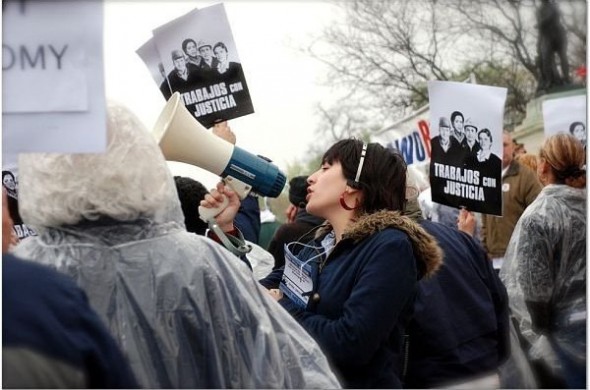
The 1990s witnessed a wave of political activism targeting economic inequality and workers’ rights. Attacks by corporate America on labor unions left workers fighting for their livelihoods. Jobs were being sent overseas, factories were shutting down, and wages and benefits were being cut. In addition, many of the victories of the labor movement such as public assistance and welfare programs were under attack from Congress. However, unions and workers were standing up, and fighting back. At the same time, students across the country were mobilizing to fight sweatshop conditions and standing with campus workers’ battles for decent wages and working conditions.
In 1987, Jobs with Justice was created to bring community organizations, labor unions, faith leaders, and students together to work for economic justice. Since it’s founding, Jobs with Justice had worked closely with the United States Student Association, the oldest and largest progressive student organization in the United States. As workers and students fought against the corporate attacks on communities throughout the 1990s, Jobs with Justice and USSA realized the need to formalize the student-worker alliance. In the fall of 1999, Jobs with Justice and USSA created the Student Labor Action Project (SLAP). A joint project between the two organizations, SLAP would bring workers and students together to run campaigns that created real change in people’s lives. For over a decade, the Student Labor Action Project has been building student and worker power across the United States. We have been fighting for the right to unionize, the right to fair contracts, the right to a living wage, and the right to affordable and accessible higher education.
Click on a year to see the campaigns and victories we have achieved over the years.
1999 | 2000 | 2001 | 2002 | 2003 | 2004 | 2005 | 2006 | 2007 | 2008 | 2009 | 2010 | 2011 | 2012
The Student Labor Action Project is created on October 1, 1999 as a joint project between Jobs with Justice and the United States Student Association. USSA and JwJ hired Treston Faulker as the first SLAP coordinator.
SLAP engaged students working with on the “Kick Sodexho* Off Campus” campaign. Sodexho was a major food service provider on college campuses and fiercely anti-union. Sodexho also had strong financial ties to the Corrections Corporations of America, the largest for-profit prison company in the U.S. SLAP partnered with the Prison Moratorium Project to raise awareness concerning Sodexho’s links to the CCA through the “Not with Our Money” campaign; which sought to have university’s divest from Sodexho because of their ties to CCA. “Kick Sodexho Off Campus” continued to be an ongoing campaign for student-labor activists across the country.
*Sodexo removed the “h” from its name in 2008
In its first full year of existence, SLAP engaged in a number of campaigns and solidarity work to advance the student and labor movement. Under the leadership of Treston Faulker, SLAP chapters began to sprout in campus and communities across the country. SLAP assisted in a “Teach-In” at Catholic University as part of SEIU’s Justice for Janitors Campaign. SLAP was there to help educate students on measures they could take to stand with janitors and improve the economic conditions of workers on their campuses.
The first ever April 4th Student Labor Day of Action was held in 2000, and featured 59 actions in 32 states. The Day of Action was to commemorate the assassination of Dr. Martin Luther King and honor his commitment to the struggle for economic and social justice. In Richmond, Indiana students from Earlham College, Indiana University at Bloomington, and Purdue University joined over 400 people in a march to support sanitation workers seeking to join AFSCME. At The George Washington University graduate students attempting to unionize with the United Autoworkers held a teach-in about the history of unions and the benefit of unions to workers. Unionized graduate students from the University of Massachusetts Amherst and New York University spoke at the teach-in and rallied in solidarity with the graduate students at GW.
Laura McSpedon was hired as the second SLAP coordinator.
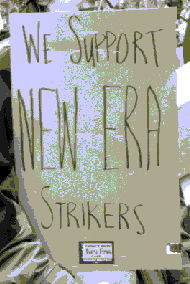 When CWA union workers went on strike against New Era Cap Company in Derby, New York, they were threatened with a permanent factory shutdown and move overseas. However, community partners rallied together to support the union, including SLAP. Recognizing the need for student activism due to New Era contracts with universities, SLAP connected the CWA with USAS and built a strategy to incorporate students. SLAP and USAS mobilized hundreds of students across the country to protest against New Era and show solidarity with workers. A year later, the CWA won a fair contract and kept the factory open.
When CWA union workers went on strike against New Era Cap Company in Derby, New York, they were threatened with a permanent factory shutdown and move overseas. However, community partners rallied together to support the union, including SLAP. Recognizing the need for student activism due to New Era contracts with universities, SLAP connected the CWA with USAS and built a strategy to incorporate students. SLAP and USAS mobilized hundreds of students across the country to protest against New Era and show solidarity with workers. A year later, the CWA won a fair contract and kept the factory open.
In the Summer of 2001, SLAP organized the Student-Labor Pre-Conference at the JwJ Annual Meeting. Roughly 125 students attended the pre-conference. SLAP worked with USSA and USAS to organize a round table discussion of national unions and student groups on October 24th. Held at the AFL-CIO headquarters in Washington D.C., the meeting brought key student and labor leaders together to share goals, priorities, and visions for the coming year to create a higher level of cohesion at the national level surrounding campaigns.
In 2001, the April 4th Student Labor Day of Action produced 80 actions across the country. In D.C., Jews United for Justice commemorated the assassination of MLK Jr. with a panel of speakers from Jewish and labor organizations to draw parallels between the Exodus story and the Civil Rights Movement. At Georgetown University 16 groups sponsored a rally for social justice and showed the documentary “At the River I Stand” which commemorates Dr. King’s support for economic justice. SLAP published and released SLACtivist News, a twice-per-semester publication documenting student/labor campaigns across the country. By the end of 2001, the SLAP database had grown to over 1,000 students. SLAP conducted six GROW trainings in Kentucky, Michigan, Pittsburgh, Eugene, Seattle, and Chicago.
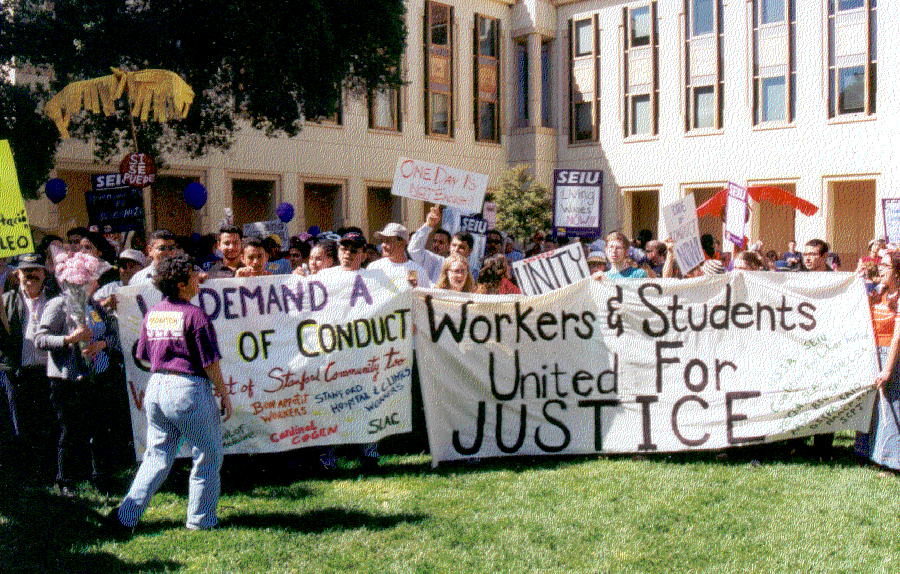 The Student Labor Action Project’s annual April 4th Student Labor Day of Action reached new heights in 2002, with over 100 actions and events taking place across the country. Activists at Harvard built a makeshift city on their campus to bring attention to the increasing costs of living workers had to pay to live near Harvard. The office of the president at Providence College became the target of protest, as students rallied to demand a living wage and support striking janitor workers. At Stanford University, over 1,000 students marched demanding a code of conduct to protect their campus workers, and janitorial workers and students at UC-San Diego rallied for the right to organize. SLAP scored major victories as part of April 4th events with graduate students at Temple University winning their first contract, and janitors at Morehouse College winning a raise in efforts to receive a living wage.
The Student Labor Action Project’s annual April 4th Student Labor Day of Action reached new heights in 2002, with over 100 actions and events taking place across the country. Activists at Harvard built a makeshift city on their campus to bring attention to the increasing costs of living workers had to pay to live near Harvard. The office of the president at Providence College became the target of protest, as students rallied to demand a living wage and support striking janitor workers. At Stanford University, over 1,000 students marched demanding a code of conduct to protect their campus workers, and janitorial workers and students at UC-San Diego rallied for the right to organize. SLAP scored major victories as part of April 4th events with graduate students at Temple University winning their first contract, and janitors at Morehouse College winning a raise in efforts to receive a living wage.
SLAP conducted two GROW trainings in Boston as a means to assist students at Harvard University waging a living wage campaign. After months of struggle and pressuring administrators and alumni, Harvard established a living wage for university and sub-contracted employees.
On March 5, 2002, Resident Assistants at the University of Massachusetts Amherst voted to join the UAW. However, university officials refused to recognize the results of the union election. Students and community forces came together to pressure UMass to recognize the union, but the school would not budge. On April 29th, RAs and their supports, including Western Mass SLAP, staged a sit-in to protest the universities actions. Thirty-six students were arrested, but UMass eventually conceded and recognized the union, the first undergraduate union of its kind.
On September 30, 10,000 Boston janitors organized with SEIU went on strike, the largest the city had seen in years. Over 2,000 janitors worked on Boston college campuses and janitors at Northeastern University and MIT were on strike. To support the fight for a fair contract, the Boston Student Labor Action Project organized over a dozen actions in just 6 weeks. Two weeks before workers went on strike, Boston SLAP members staged a sit-in at Boston Properties, the largest property owner in Boston. Seven students were arrested and the action galvanized students across the city. At Northeastern, over 250 students walked out of classes demanding the school’s President release a statement in support of the janitors. SLAP students leafleted inside striking buildings, attended nightly marches with janitors, and collected signatures of support from students and professors. Chicago SLAP and Washington D.C. SLAP held solidarity actions, and USAS organized actions at schools cleaned by UNICOO, the major corporate obstacle to a fair settlement. After promises of massive civil disobedience across Boston, building owners finally reached a settlement on October 23rd.
Ana Rosa Rizo became the third SLAP coordinator.
After three years of successful April 4th Student Labor Day of Action, SLAP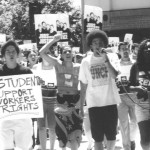 revamped the event to be a week long, Student Labor Week of Action from March 31st to April 4th. The week honors the lives of two great advocates of social and economic justice-Cesar Chavez and Dr. Martin Luther King Jr. Chavez was born on the 31st, and King was assassinated on the 4th. Over the course of the week, 280 events and actions were held.
revamped the event to be a week long, Student Labor Week of Action from March 31st to April 4th. The week honors the lives of two great advocates of social and economic justice-Cesar Chavez and Dr. Martin Luther King Jr. Chavez was born on the 31st, and King was assassinated on the 4th. Over the course of the week, 280 events and actions were held.
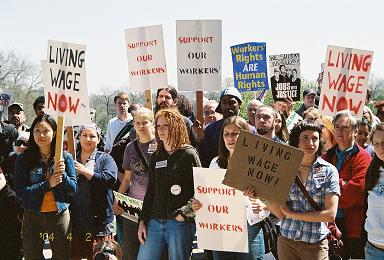 National Student Labor Week of Action features 250 actions around U.S. college campuses. Students at the UMass Boston rallied to support 400 janitors who had been denied a pay increase. At George Washington University, students occupied the Student Union and refused to leave until a labor code of conduct was adopted. At the University of Wisconsin, theTeaching Assistants’ Association prepared to go on strike after contract negotiations broke down over healthcare costs. Student labor activists organized a rally in solidarity of the TAA and to lower tuition costs for all students. At Washington University in St. Louis, students demanded the return of 36 Nicaraguan custodial and maintenance workers. The workers were forced to leave the country when their contract with G&G Building Services was terminated in October 2003. Students came together with Jobs with Justice, SEIU, and other community partners to rally for the return of the workers.
National Student Labor Week of Action features 250 actions around U.S. college campuses. Students at the UMass Boston rallied to support 400 janitors who had been denied a pay increase. At George Washington University, students occupied the Student Union and refused to leave until a labor code of conduct was adopted. At the University of Wisconsin, theTeaching Assistants’ Association prepared to go on strike after contract negotiations broke down over healthcare costs. Student labor activists organized a rally in solidarity of the TAA and to lower tuition costs for all students. At Washington University in St. Louis, students demanded the return of 36 Nicaraguan custodial and maintenance workers. The workers were forced to leave the country when their contract with G&G Building Services was terminated in October 2003. Students came together with Jobs with Justice, SEIU, and other community partners to rally for the return of the workers.
SLAP and the Student Farmworker Alliance supported the Coalition of Immokalee Workers in their efforts to get one cent increase on the price of tomatoes per pound. Known as the “Beat the Bell” campaign, SLAP, SFA, and the CIW targeted the fast food chain Taco Bell. The one cent increase would greatly improve the lives of agricultural workers in Florida (where the CIW was based.) Students worked to support the CIW boycott against Taco Bell in hopes of gaining a victory for workers.
Carl Lipscombe became the fourth SLAP coordinator.
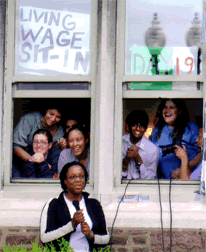 After 18 months of pressuring their school to enact a living wage, students at Washington University in St. Louis took direct action as part of the Student Labor Week of Action. On April 4th, students began a sit-in at the admissions office, demanding that school officials meet to discuss a living wage for campus workers. A week past and the university refused to budge, compelling the students to engage in a hunger strike. For five days the students held firm until the administration buckled and agreed to meet. On April 22nd, the students won a massive victory with the university agreeing increase the salaries and benefits of campus workers, join the Workers Right Consortium, and the creation of a joint student-university committee to improve the school’s labor practices. Student leader Ojiugo Uzoma stated, “We won more in the last 19 days than we won in the last 18 months put together.”
After 18 months of pressuring their school to enact a living wage, students at Washington University in St. Louis took direct action as part of the Student Labor Week of Action. On April 4th, students began a sit-in at the admissions office, demanding that school officials meet to discuss a living wage for campus workers. A week past and the university refused to budge, compelling the students to engage in a hunger strike. For five days the students held firm until the administration buckled and agreed to meet. On April 22nd, the students won a massive victory with the university agreeing increase the salaries and benefits of campus workers, join the Workers Right Consortium, and the creation of a joint student-university committee to improve the school’s labor practices. Student leader Ojiugo Uzoma stated, “We won more in the last 19 days than we won in the last 18 months put together.”
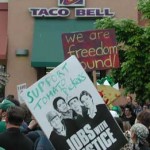 SLAP, SFA, and the CIW scored a massive victory in the “Beat the Bell” campaign. After a four year campaign, Taco Bell agreed to meet all the demands of the CIW. In addition to the price increase, the victory established key precedents for farm labor reform. Taco Bell agreed to direct payment of farmworkers along its supply chain to protect against wage theft. An enforceable Code of Conduct was established for agricultural suppliers in the fast-food industry to monitor complaints of worker abuse. Market incentives were given to agricultural suppliers who respected their workers’ human rights, even those rights not guaranteed by law. Taco Bell also agreed to be 100% transparent about its tomato purchases in Florida.
SLAP, SFA, and the CIW scored a massive victory in the “Beat the Bell” campaign. After a four year campaign, Taco Bell agreed to meet all the demands of the CIW. In addition to the price increase, the victory established key precedents for farm labor reform. Taco Bell agreed to direct payment of farmworkers along its supply chain to protect against wage theft. An enforceable Code of Conduct was established for agricultural suppliers in the fast-food industry to monitor complaints of worker abuse. Market incentives were given to agricultural suppliers who respected their workers’ human rights, even those rights not guaranteed by law. Taco Bell also agreed to be 100% transparent about its tomato purchases in Florida.
SLAP students at Temple University and University of Pennsylvania in  Philadelphia waged a campaign against security guard firm, AlliedBarton. Philly SLAP and the city’s Jobs with Justice coalition held numerous marches and protests to try and secure a living wage and benefits for security officers working on campuses and throughout the city. In Vermont, SLAP students also ran a living wage campaign for campuses workers. The National Student Labor Week of Action featured 250 actions on campuses. In addition to living wage campaigns going on throughout the nation, SLAP students also held actions against American Eagle and in solidarity with the Justice at Smithfield campaign.
Philadelphia waged a campaign against security guard firm, AlliedBarton. Philly SLAP and the city’s Jobs with Justice coalition held numerous marches and protests to try and secure a living wage and benefits for security officers working on campuses and throughout the city. In Vermont, SLAP students also ran a living wage campaign for campuses workers. The National Student Labor Week of Action featured 250 actions on campuses. In addition to living wage campaigns going on throughout the nation, SLAP students also held actions against American Eagle and in solidarity with the Justice at Smithfield campaign.
In 2006, the Living Wage Action Coalition was founded to coordinate living wage campaigns taking place across the country. LWAC grew out of a living wage campaign at Georgetown University, and the students who ran that campaign hoped to create a larger network that could provide trainings, resources, and supports for struggles across the country. SLAP was a major partner with LWAC and provided its expertise to the assist the movement for a living wage.
Carlos Jimenez was hired as the fifth SLAP Coordinator.
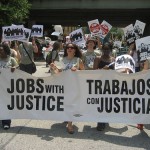
SLAP students participated in the U.S. Social Forum in Atlanta. Jobs with Justice had been a major planner in the Social Forum, designed to counter the World Economic Forums taking place that were advocating free trade as a desired economic principle. The World Social Forum was about building a global economy based around sustainability, communities, and fair trade. SLAP took a leading role in the youth component of the conference, holding workshops and trainings on how students could play their part in the struggle for global economic justice.
In support of the Coalition of Immokalee Workers’ campaign against McDonald’s, SLAP worked closely with the Student Farmworker Alliance to organize several hundred actions all over the country which resulted in McDonald’s agreeing to pay the farmworkers who pick tomatoes for much of the country a penny more per pound and establish a code of conduct respecting their rights.
The Student Labor Action Project (SLAP) staffed and supported the newly-formed Student Economic Justice Action Coalition (SEJAC). SEJAC is an informal coalition of the United Students Against Sweatshops, United States Student Association, Young Democratic Socialists, Movimiento Estudiantil Chicano/a de Aztlan, Student Farmworker Alliance, Young Communist League, and the Student Labor Action Project working together on social and economic justice issues on campuses across the country. The group collaborates on the Student Labor Week of Action and shares information on national campaigns.
The Student Labor Action Project organized a fantastic National Student Labor Week of Action from March 31st-April 4th that included students on more than 200 campuses and 100 cities across the country protesting the corporatization of higher education and supporting workers organizing on campuses and in neighboring communities.
In the fall of 2008, the Student Labor Action Project worked with the United States Student Association to register college students to vote and get them to the polls. The voter drive by SLAP and USSA resulted in the largest registration and voter turnout of young people during the 2008 Presidential Election.
Thousands of students participated in over 225 actions and events during the week of action. Students demanded that their universities and corporations pay their workers living wages, provide adequate medical benefits, respect workers rights to organize, collectively bargain fairly, and more.
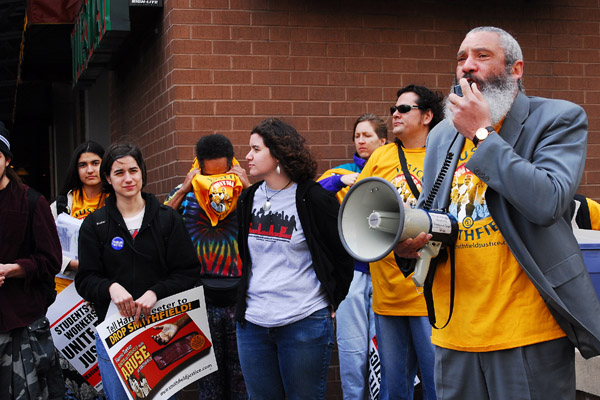 SLAP and Jobs with Justice worked on multiple campaigns that won key victories in 2008. After a two year struggle, workers at the Tar Heel Smithfield meat packing plant won union recognition with the UFCW. SLAP had helped to coordinate actions on campus standing in solidarity with Smithfield workers. SLAP helped to win a living wage for food service and custodial workers in Burlington, Vermont. SLAP stood in solidarity with CWA and IBEW Verizon workers in their efforts to win a fair contract.
SLAP and Jobs with Justice worked on multiple campaigns that won key victories in 2008. After a two year struggle, workers at the Tar Heel Smithfield meat packing plant won union recognition with the UFCW. SLAP had helped to coordinate actions on campus standing in solidarity with Smithfield workers. SLAP helped to win a living wage for food service and custodial workers in Burlington, Vermont. SLAP stood in solidarity with CWA and IBEW Verizon workers in their efforts to win a fair contract.
Maria Escobar became the sixth SLAP Coordinator.
Students and workers came together during the National Student Labor Week of Action to demand the passage of the Employee Free Choice Act. This important legislation would give workers a fair and direct path to form unions through majority sign-up, help employees secure a contract with their employer in a reasonable period of time, and toughen penalties against employers who violate workers’ rights.
At Temple University, SLAP students were an integral part of the campaign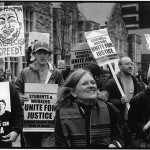 which led to the victory of the Philadelphia Security Union at the Philadelphia Museum of Art. Philadelphia SLAP students also held rallies and educational events in support of the local AFSCME teachers’ union in reaching their contract. In Maine, SLAP students at University of Maine were part of a statewide coalition to defeat the TABOR ballot initiative in this state. Through tabling, class presentations and educational events, students were able to mobilize students to vote against this initiative.
which led to the victory of the Philadelphia Security Union at the Philadelphia Museum of Art. Philadelphia SLAP students also held rallies and educational events in support of the local AFSCME teachers’ union in reaching their contract. In Maine, SLAP students at University of Maine were part of a statewide coalition to defeat the TABOR ballot initiative in this state. Through tabling, class presentations and educational events, students were able to mobilize students to vote against this initiative.
Founded in 2009, SLAP at the University of Central Florida has stood as a force in the progressive community in the Orlando area. In the group’s first year of existence, SLAP won a campaign to break UCF’s ties with Russell Athletic, an apparel-maker with ties to sweatshop labor.
A restructuring of SLAP resulted in the creation of the SLAP Model. In an effort for USSA and JwJ to align their bases and create a more unified progressive movement, SLAP would intentionally target campuses with USSA membership and with a local JwJ coalition. This model would help student groups gain a clearer understanding of the connection between the labor movement and the movement for accessible higher education.
SLAP worked with the United States Student Association to enact the Dream 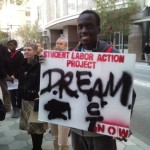 Act at the federal level. SLAP students worked to collect petitions and organize lobby days to pressure elected officials to pass the Dream Act. Also in conjunction with USSA, SLAP students took part in the “WTF: Where’s the Funding?” campaign to advocate for funding of higher education instead of cuts.
Act at the federal level. SLAP students worked to collect petitions and organize lobby days to pressure elected officials to pass the Dream Act. Also in conjunction with USSA, SLAP students took part in the “WTF: Where’s the Funding?” campaign to advocate for funding of higher education instead of cuts.
From March 28th-April 4th, students and workers came together to take action on issues such as the Dream Act, fair contracts for campus employees, sustainability on campus and living wages for all, and funding for higher education. With over 108 actions in 95 cities across the country, the National Student labor Week of Action proved once again to be a time to commemorate Cesar Chavez and Dr. Martin Luther King, Jr. through direct action and solidarity between students and workers across the country.
Chris Hicks was hired as the seventh SLAP Coordinator.
In the Spring of 2011, the newly formed UMass Amherst SLAP worked with 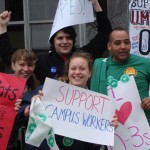 AFSCME to organize over 300 dining hall workers listed as temporary workers. Due to workers’ temporary status, they faced abuses by the administration. SLAP and AFSCME came together for a union drive, with SLAP helping to inform workers about the union and raise awareness amongst the campus population. In May, workers voted overwhelmingly to join the union.
AFSCME to organize over 300 dining hall workers listed as temporary workers. Due to workers’ temporary status, they faced abuses by the administration. SLAP and AFSCME came together for a union drive, with SLAP helping to inform workers about the union and raise awareness amongst the campus population. In May, workers voted overwhelmingly to join the union.
Beginning in the summer of 2012, SLAP engaged in the Change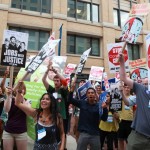 Walmart, Change America campaign, working with the Organization for Respect at Walmart. In July 2012, SLAP students from George Washington University participated in a flash mob at a Walmart in Maryland as part of the Respect D.C. campaign to keep Walmart from opening new stores in Washington D.C. The flash mob featured song, dance, and a live band. In August at the Jobs with Justice National Conference, SLAP students protested with JwJ against Walmart’s attempts to move into the nation’s capital.
Walmart, Change America campaign, working with the Organization for Respect at Walmart. In July 2012, SLAP students from George Washington University participated in a flash mob at a Walmart in Maryland as part of the Respect D.C. campaign to keep Walmart from opening new stores in Washington D.C. The flash mob featured song, dance, and a live band. In August at the Jobs with Justice National Conference, SLAP students protested with JwJ against Walmart’s attempts to move into the nation’s capital.
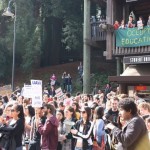 In October 2011, two new SLAP chapters were founded at the University of California, Santa Cruz and the University of Oregon. Throughout the fall of 2011, SLAP students played active roles in Occupy Wall Street and the 99% Movement. SLAP members conducted General Assemblies on their campuses, led student walk-outs over the rising cost of higher education, and rallied with community and labor groups against the 1% hold over the country. Also in October, SLAP students journeyed to Washington D.C. from all parts of the country to stand with janitors who had walked out of their buildings as part of SEIU’s Justice for Janitors campaign. As a result of the walk out and march, the janitors won a fair contract.
In October 2011, two new SLAP chapters were founded at the University of California, Santa Cruz and the University of Oregon. Throughout the fall of 2011, SLAP students played active roles in Occupy Wall Street and the 99% Movement. SLAP members conducted General Assemblies on their campuses, led student walk-outs over the rising cost of higher education, and rallied with community and labor groups against the 1% hold over the country. Also in October, SLAP students journeyed to Washington D.C. from all parts of the country to stand with janitors who had walked out of their buildings as part of SEIU’s Justice for Janitors campaign. As a result of the walk out and march, the janitors won a fair contract.
In 2012, National SLAP launched at campaign aimed at Sallie Mae, the largest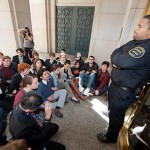 profiteer from student debt. At USSA’s LegCon, SLAP students were key players in leading a 300 plus student march and protest against the student loan giant, Sallie Mae. The action resulted in the arrests of 36 students engaged in non-violent civil disobedience. On April 25th, SLAP held a National Day of Action to raise awareness that student debt levels had reached $1 trillion. SLAP students across the country conducted banner drops and collected petitions against Sallie Mae’s predatory lending practices. In May, over 200 students and community allies went to the Sallie Mae shareholders meeting to demand Sallie Mae address concerns over the student debt bubble.
profiteer from student debt. At USSA’s LegCon, SLAP students were key players in leading a 300 plus student march and protest against the student loan giant, Sallie Mae. The action resulted in the arrests of 36 students engaged in non-violent civil disobedience. On April 25th, SLAP held a National Day of Action to raise awareness that student debt levels had reached $1 trillion. SLAP students across the country conducted banner drops and collected petitions against Sallie Mae’s predatory lending practices. In May, over 200 students and community allies went to the Sallie Mae shareholders meeting to demand Sallie Mae address concerns over the student debt bubble.
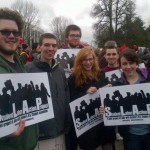 The Student Labor Action Project played an integral role in the “Move Your Money” campaign, a nationwide movement to divest from predatory big banks and move money into community based banks and credit unions. SLAP worked to move the accounts of the University of California Student Association from US Bank, United Council of University Wisconsin Students from MNI Bank, and the United States Student Association from Wells Fargo.
The Student Labor Action Project played an integral role in the “Move Your Money” campaign, a nationwide movement to divest from predatory big banks and move money into community based banks and credit unions. SLAP worked to move the accounts of the University of California Student Association from US Bank, United Council of University Wisconsin Students from MNI Bank, and the United States Student Association from Wells Fargo.
The Student Labor Action Project continued to stand in solidarity with OUR Walmart and the Change Walmart, Change America campaign by engaging in a number of direct actions. At the United States Student Association’s Legislative Conference, SLAP led 50 students in a mic-check at a Walmart to win back bonuses that had been withheld from workers. At USSA’s National Student Congress, another 50 students, led by SLAP, conducted a mic-check at a Walmart in Madison, Wisconsin to raise awareness for OUR Walmart. The action resulted in Walmart management shutting down the store.
The year 2012 was a big one for local SLAP Chapters as well. At UMass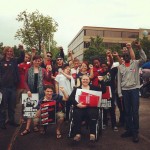 Amherst, SLAP worked to create a coalition of student, faculty, and staff allies to prevent the loss of 70 student jobs. At the University of Central Florida, SLAP students engaged in solidarity actions with CWA workers against Verizon. UCF SLAP supported the efforts of Verizon workers to win a fair contract by attending the Verizon shareholders meeting in Huntsville, Alabama. Students went inside the meeting and mic-checked seven times before being removed. At the University of California, Santa Cruz, SLAP students worked in a coalition to ensure affordable housing for students with families on campus. UCSC SLAP’s efforts drew the attention of local media on the issue of affordable housing and helped to garner the attention of various administrative officials, leading to much needed student involvement on decisions being made.
Amherst, SLAP worked to create a coalition of student, faculty, and staff allies to prevent the loss of 70 student jobs. At the University of Central Florida, SLAP students engaged in solidarity actions with CWA workers against Verizon. UCF SLAP supported the efforts of Verizon workers to win a fair contract by attending the Verizon shareholders meeting in Huntsville, Alabama. Students went inside the meeting and mic-checked seven times before being removed. At the University of California, Santa Cruz, SLAP students worked in a coalition to ensure affordable housing for students with families on campus. UCSC SLAP’s efforts drew the attention of local media on the issue of affordable housing and helped to garner the attention of various administrative officials, leading to much needed student involvement on decisions being made.
